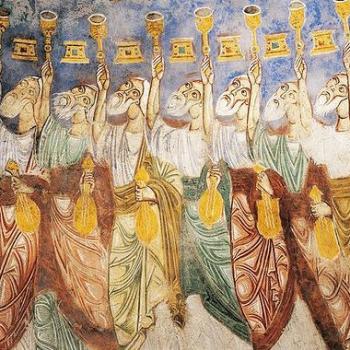Why I Believe in Creatio ex nihilo (Even Though the Bible Doesn’t Directly Teach It)
Every once in a while I meet someone who, while exhibiting every sign of being a true Christian, denies the traditional Christian doctrine of “creatio ex nihilo”—creation out of nothing. This belief, the “prior actuality of God” (Austin Farrer’s term), combined with the idea that God created in the beginning out of nothing (not “Nothingness”—Greek philosophy’s me ōn), is not directly taught in Scripture. However, the early church fathers, especially (but not only) the Cappadocian Fathers (Basil of Caeasarea, Gregory of Nyssa, and Gregory Nazianzus), insisted on it against Greek philosophy and Roman religious myths. Gradually it was raised to the status of dogma by most branches of Christianity even if rarely, if ever, explicitly stated as such in creeds or confessions of faith. Why?
Creation out of nothing is the only alternative to four alternative beliefs about creation that are absolutely untenable for Christian thought. One is pantheism or panentheism—belief that God and the world are either identical or interdependent. In either case the world is part of God or so inextricably united with God eternally that God is dependent on it. (Here “world” refer to creation, the universe, finite reality.) Another alternative belief about creation is that God created the world out of some pre-existing matter that he did not himself create. In that view God “created” by organizing an eternal something that was chaotic and stood over against him. Yet another alternative belief is that God created the world out of himself in which case the world is made of “God stuff”—God’s own substance. Finally, a mostly modern, secular view is that some world (or substance, energy) has always existed and God, if he exists at all, has nothing to do with its origin or development.
If there is a fifth possibility, alternative to creation out of nothing, I am not aware of it. All that I have considered “boil down” to one of those four.
Many Christians, to say nothing of non-Christians, embrace one of the alternative beliefs about creation, for whatever reasons, and feel permitted to do so because neither Scripture nor creedal orthodoxy explicitly requires creation out of nothing. (Some Christian denominations may require it, but most do not explicitly say so.)
So is creation out of nothing just speculation on the part of orthodox Christian theologians? Why has this idea been so prominent and defended so strongly by traditional Christian theologians if Scripture and creeds do not explicitly require it? Why do I believe in it while admitting it is not explicitly taught in Scripture and points to an impenetrable mystery?
Creation out of nothing is not mere speculation; it is based on other beliefs that are explicitly taught in Scripture and that are part and parcel of traditional, orthodox, classical “Great Tradition” Christianity.
Here is where I think many modern Christians, both conservative and progressive, across that spectrum, fail to realize there are necessary Christian beliefs that are not explicitly taught in Scripture. Yes, admittedly, they are “man-made doctrines” and are more part of Christian philosophy, Christian presuppositions underlying explicit dogmas about Christ, the Trinity, and salvation, than confessional, systematic theology itself. (This is a somewhat artificial distinction but I find it helpful at times and this is one such “time” or instance. Some would call it “the Christian worldview”—the set of basic perspectives, “blik” [to borrow a term from philosophy R. M. Hare], that underlie Christian dogmas about God, Christ, and salvation.)
Creation out of nothing is part of what Emil Brunner called “Christian ontology”—derived from revelation but not explicitly revealed. Without it certain revealed truths cannot be maintained or defended; they slip away without this ontological, metaphysical foundation.
Creation out of nothing (in the beginning, not moment-by-moment as Jonathan Edwards speculated) is necessary, as I said, because without it one will believe in one of the alternative views mentioned above and will eventually find crucial gospel tenets dissolving. It is the only alternative to those views of creation and alone supports and defends the revealed gospel of truth about God, Christ, and salvation.
Now, I find it necessary to warn not to attempt to provide an alternative to creation out of nothing by saying God created “out of love.” That is not an alternative to creation out of nothing; it is simply speaking of God’s motive or disposition behind and for creation—not the what out of which God created. It is completely compatible with creation out of nothing and does not replace it. When someone says God created “out of love” they are not expressing an alternative to creation out of nothing.
All of the above is to say that there is a Christian ontology, a Christian metaphysical worldview, perspective about reality, that is not itself explicitly revealed but is established because it is the only support for what is revealed and expressed in classical, orthodox Christianity. Often its support is that alternative views are simply untenable in light of revealed truth and, if held, lead inexorably to distortions of the gospel itself.
So what revealed truths, held and taught by all branches of catholic and orthodox Christianity (including the Reformers) make creation out of nothing necessary in spite of its impenetrable mysteriousness?
First is the transcendence of God, God’s holiness, wholly otherness, majesty, power, glory and freedom. Throughout Scripture God is revealed as not dependent on anything in creation for his actuality. Do you need a proof text? Paul to the Athenians in Acts 17:22-31: God does not need anything and gives life and breath to all mortals. Some may point to another portion of Paul’s soliloquy in Athens—that we “live and move and have our being” in God and are “God’s offspring.” None of that undermines and indeed must be interpreted in light of God does not need anything. That is a constant theme throughout Scripture: That God is “above” creation and does not need anything outside of himself to be God. A God who needs the world for anything is not the God of the Bible. “Without the world, God is not God” is Hegel’s heresy, the root of all panentheism, and it undercuts and undermines God’s holy transcendence. This is “another God,” not the God of Abraham, Isaac, Jacob, Isaiah, Jesus and Paul.
Second is the gratuity of grace, the revealed truth that redemption is solely gift and that grace for salvation cannot be forced or necessary. It also cannot be presumed as if God owed it to himself or anyone or anything. This belief is integral to Christian soteriology and arises out of biblical revelation and out of the very meaning of grace itself: “For by grace are you saved…and that not of yourselves….” (Ephesians 2:8-9) If creation out of nothing is not firmly held and defended, the freedom of God in redemption and salvation, grace itself as sheer gift, slips away.
Third, finally, is the reality of evil and God’s non-involvement in and non-participation in evil. Creation out of nothing protects the reality of evil from being reduced to illusion (our not-yet-knowing of our own divinity) or necessity (in which case it is not really evil).
These three Christian ideas, derived from revelation itself, if not directly revealed, depend on creation out of nothing. One or more of them completely undercuts and undermines all the alternative perspectives on reality. Only creation out of nothing protects God’s holy freedom and wholly otherness, the gratuity of redemption, and the reality of creaturely opposition to God as evil/sin.
In other words, even though creation out of nothing is not explicitly revealed or normally stated in creeds and confessions of Christian denominations and churches, it inevitably appears as we bore down to inspect and think about the presuppositional pillars that uphold ecumenical Christian belief and experience. It is an aspect of Christian ontology which is just as important as Christian doctrine. The line between the two is admittedly blurry, not absolutely distinct, but we might say that Christian ontology appears not so much directly out of revelation as out of close inspection of Christian beliefs based on revelation in light of alternative religions, philosophies and worldviews in culture. Creation out of nothing was discovered, not invented, by the church fathers as they examined the worldviews, religions and philosophies around them in Hellenistic culture. So today we need to rediscover it and embrace and defend it as we examine modern and postmodern secular and pagan worldviews, religions and philosophies in and among which the same alternative beliefs about God and creation arise (as in Hellenistic culture).
In other words, we can no longer take creation out of nothing for granted; alternative beliefs about God and the world are seeping and creeping into Christian churches. We need to find spaces for teaching Christian ontology (under whatever name). We need to correct Christians who are confused about God and creation, especially those who are coming to believe that creation (e.g., our souls) are “part of God” or that God “did his best with what he had” in creation which is the explanation for evil.
Note: This is an opening to a conversation among Christians. I don’t expect non-Christians to believe in creation out of nothing (although some might). If you choose to comment or question, please keep that in mind. If you are not a catholic-orthodox and/or evangelical Christian (concerned for biblical revelation and basic Christian orthodoxy) you are free to ask questions about Christian belief including creation out of nothing, but please do not misuse this blog to promote your alternative belief system or worldview (or metaphysical/ontological skepticism). If you perceive yourself to be a catholic-orthodox and/or evangelical Christian and choose to respond negatively (with disagreement) state whether you agree with the three basic Christian dogmas/doctrines I stated that I argue require (together) belief in creation out of nothing. In any case, keep in mind that the purpose here is dialogue. Keep it civil.
















